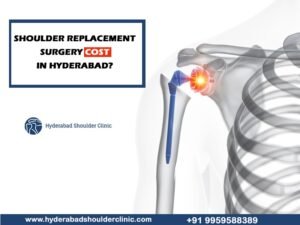A person’s shoulder is the most flexible and mobile joint in the human body. Our every small daily task puts the shoulder under constant motion and stress. Excessive use or trauma causes many to experience shoulder osteoarthritis during their lives. The patient experiences chronic joint pain, swelling and inflammation. The shoulder bone is covered with smooth, white articular cartilage. When there is deterioration of the cartilage, a person suffers from Osteoarthritis. Over some time, the bones keep rubbing each other, and the shoulder motion causes a total loss of cartilage.
There has been data suggesting that biological injections are beneficial for patients with early to moderate Osteoarthritis. Stem cell therapy for patients with shoulder arthritis helps them manage painful symptoms associated with early to moderate shoulder arthritis.
What is shoulder replacement surgery?

Shoulder replacement surgery is the removal of damaged areas of bone and replacing them with metal and plastic implants in an arthroscopic procedure. The shoulder is a ball-and-socket joint, and the round head of the upper arm bone fits into a shallow socket in the shoulder. Any damage to this joint causes pain, weakness and stiffness. During replacement surgery, the surgeon can include partial and total using either anatomic or reverse implants.
Why is an alternative to shoulder replacement surgery required?

There are potential risks with shoulder replacement surgery. Furthermore, factors such as long-term healing and immobility are also contributing to the search for alternatives. Below is the list of potential complications due to shoulder replacement surgery:
Recurrence of Dislocation: The ball of your new joint may come out of the socket.
Fracture of the bones: During or after the surgery, the humerus bone, the scapula or the glenoid bone can break.
Implant loosening: though the implants are durable, they may loosen or become worn over time. Another surgery to replace these loose components may be required.
Rotator cuff failure: The rotator cuff, a group of muscles and tendons surrounding the shoulder joint, occasionally wears out after a partial or total shoulder replacement surgery.
Nerve damage: Nerves near the surgical site can get damaged, causing numbness, weakness and pain.
Blood clots: Clots can form after the surgery.
Infection: Infection of the surgical site or the deeper tissue can happen.
What are the alternatives to shoulder replacement surgery?
Biological injections: Conservative treatments for Osteoarthritis are rest, ice, modified activities, anti-inflammatory medications (NSAIDs), pain medications and physical therapy. Osteoarthritis is a progressive condition and has no cure. Most patients experience further articular cartilage damage during normal shoulder movements.
Many active studies are ongoing to determine the efficacy of biological injections, such as stem cells, to manage the symptoms of shoulder arthritis. The cells and biological factors may help modulate inflammatory arthritis associated with Osteoarthritis.
Stem Cells as an Alternative to Shoulder Replacement: Autologous or adult stem cells can naturally differentiate multiple tissue types. They also provide valuable biologic factors which can control the inflammatory process. Especially for you g patients who have lost cartilage in a trauma, stem cell therapy offers a possible alternative to cortisone injections.
Stem cell therapy as an alternative to shoulder replacement is fairly simple and requires a sample of bone marrow to be harvested from the patient’s body. The bone marrow is commonly taken from the hip area. After harvesting, the sample is spun in a special machine called a centrifuge to separate adult stem cells, platelets and white blood cells. Afterwards, certain healing agents are combined and injected into the damaged shoulder joint to regenerate articular cartilage and accelerate healing.
Some patient donor-type products with stem cells are harvested from placental tissue.
Viscosupplementation: Synovial fluid is rich in hyaluronic acid. In Viscosupplementation, hyaluronic acid is injected into the joint, which restores the lubrication. Though Viscosupplementation is popularly used in treating the knee, it has shown good results even in the treatment of shoulder osteoarthritis as well. This treatment does not reverse the damaged cartilage but helps slow down or prevent further damage. Other types of non-surgical shoulder replacement procedures are:
- Steroid injections
- Lubricant injection
- PRP – Platelet injection
- PRP + Lubricant
- Prolotherapy
- Amniotic Stem Cell Injection
Please note that all the above procedures are beneficial in managing the pain or slowing down the degeneration. We at Hyderabad Shoulder Clinic will give you a comprehensive list of non-surgical treatments. We first start with conservative treatments and see their progress. If the patient does not respond to these treatments, we only go for more invasive treatments. Please visit our website https://hyderabadshoulderclinic.com/ or contact us at +91 9959588389,
shoulderandsportsclinic@gmail.com.





